Lead Story
World Standards Day 2024
To mark World Standards Day on 14 October, ANEC joined the dedicated social media campaign ’Shared vision for a better world: Spotlight on SDG 9 ‘Industry, innovation, and infrastructure in the age of AI’, organised by the international standardisation organisations: IEC, ISO and ITU.
In our contribution, we focused on ’How can standards uphold fair and responsible AI for consumers while building resilient infrastructure, promoting inclusive and sustainable industrialisation, and fostering innovation?’. In particular we highlighted key aspects ANEC is advocating for in order to protect consumers’ fundamental rights in AI standardisation: e.g.: trustworthiness, inclusivity, ethics, ‘on the market’ lifecycle care.
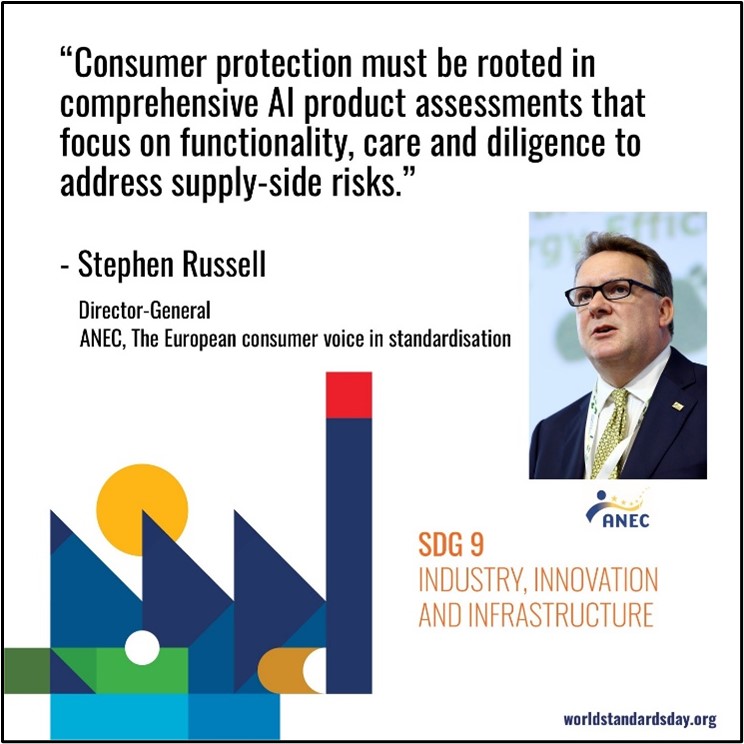
We also took part in a social media campaign with CEN and CENELEC.
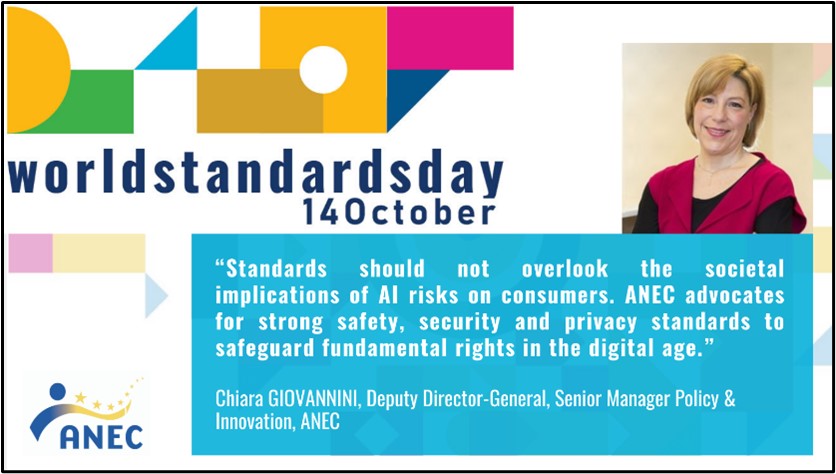
Horizontal
IMCO's exchange of views on European standardisation policy
ANEC was pleased to contribute to the IMCO Committee’s item “European Standardisation Policy: Exchange of Views with the Commission,” on 5 September 2024 at the European Parliament.
During the discussion, our Deputy Director-General, Chiara Giovannini, expressed appreciation for IMCO's past report on the “Standardisation Strategy for the Single Market.” She emphasised ANEC's commitment to ensuring that consumer interests are at the heart of the standardisation process. To achieve this, ANEC believes inclusiveness should not just be an obligation of effort but one of results.
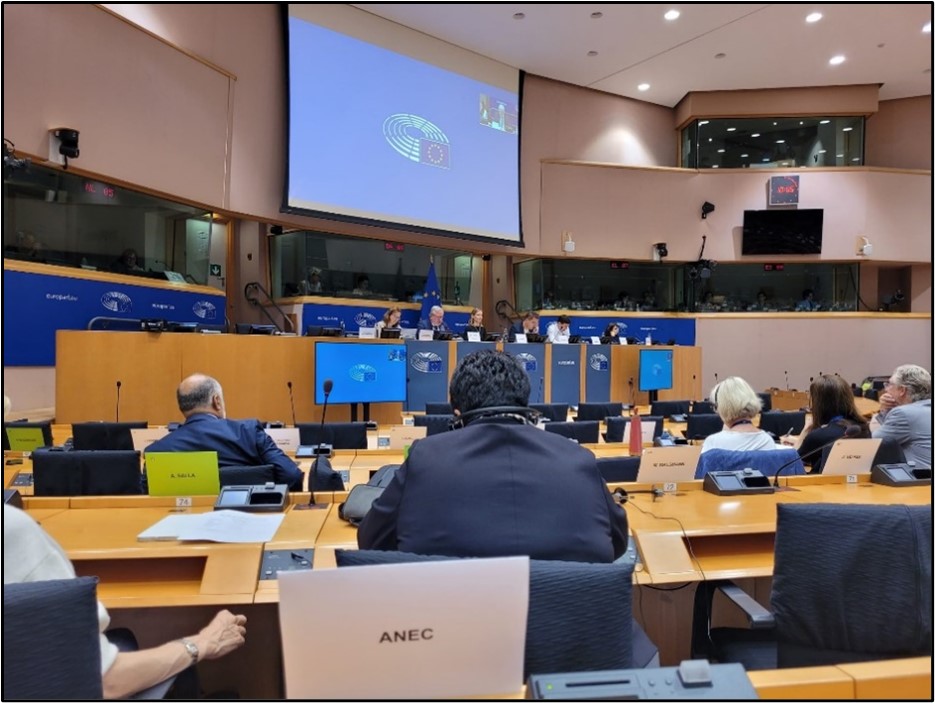
Chiara highlighted the growing role of standards in legislation, such as the AI Act and Cyber Resilience Act. She stressed that European values and fundamental rights must be central to these standards.
She explained the need to involve public authorities more in standard development, as their expertise in market surveillance can help enforce EU laws more effectively. Although rapid standardisation is sometimes needed, particularly in fast-evolving sectors like ICT, safety must never be sacrificed.
Chiara ended by underlining the importance of integrating education on standards into curricula. Equipping the next generation with knowledge on the value of standards is vital in ensuring the continued effectiveness of the standardisation process.
ANEC is confident that IMCO will continue to guarantee the robustness and fairness of the European Standardisation System.
Child Safety & Domestic Appliances
LEDs in electric toys
On 1 October, the French Agency for Food, Environmental and Occupational Health & Safety (ANSES) published an opinion on the effects of LEDs included in electric toys on children’s health. The study was commissioned by the French authorities and presented by ANSES on the occasion of the EC Expert Group on Toy Safety meeting on 1 October.
The French authorities asked ANSES to carry out a review of EN 62115:2020 ‘Electric toys - Safety' in order to check whether the standard takes into account ANSES’ recommendation to ensure eye safety for children using toys, and whether it takes sufficient account of the specific nature of children (e.g. their greater sensitivity to blue light than adults).

The study concludes that EN 62115:2020 does not guarantee compliance with the limit values needed to ensure the protection of children's eyes. ANSES therefore recommends revising the standard.
At the meeting, ANEC thanked the French authorities and ANSES for the study and its insights, and agreed on the need to be alert to the protection of children’s eyes. A follow-up meeting to discuss the way forward, which ANEC plans to attend, will be held in November.
Accessibility
Accessibility of Immovable Cultural Heritage
We were delighted to learn of the approval of the new international standard ISO 5727 ‘Accessibility and Usability of the Built Environment – Accessibility of Immovable Cultural Heritage – Principles and Methodology for Interventions’. The standard received unanimous support during its final approval phase which closed on 23 September 2024.
The standard provides clear principles and methodologies for enhancing accessibility in immovable cultural heritage sites. It outlines interventions required for conservation, restoration, or to meet specific accessibility needs, while preserving the cultural significance and integrity of these sites. It focuses on the built environment and its immediate setting, without addressing broader management or functional organizational issues unrelated to the conservation, restoration or specific accessibility interventions.
ISO 5727 is designed for a wide audience, including heritage owners, managers, curators, accessibility experts, architects, engineers, designers, user representatives, and builders. Although it provides specific guidance for accessibility in cultural heritage sites, general requirements for accessible built environments are covered under the complementary standard, ISO 21542.
On the occasion of the European Guide Dog Federation 2024 Conference on 4 October, our Deputy Director-General, Chiara Giovannini, expressed our heartfelt gratitude to David Adams, EGDF Honorary President, for his tireless dedication and invaluable contributions to the development of standards for assistance dogs. David, who represents ANEC in CEN TC 452 on Assistance dogs, stepped down as EGDF Honorary President having served his maximum term. ANEC looks forward continuing working with him.

Domestic Appliances
Revision of EN 1860-1 on barbecues
Indoor use of charcoal barbecue grills (e.g. in tents, boats, caravans) can lead to carbon monoxide (CO) accumulations that reach dangerous and even fatal levels.
As consumers are often unaware of the dangers of using a charcoal barbecue in a confined space, following a request from the German authorities and ANEC, CEN adopted an amendment to EN 1860-1:2013 ‘Appliances, solid fuels and firelighters for barbecuing - Part 1: Barbecues burning solid fuels - Requirements and test methods” in 2017. This amendment introduced a safety pictogram and warning not to use barbecues indoors.
In September 2024, ANEC welcomed adoption of the revision of EN 1860-1:2013+A1:2017. The pictogram and warning sentence “Do not use the barbecue in a confined and/or habitable space e.g., houses, tents, caravans, motor homes, boats. Danger of carbon monoxide poisoning fatality” were unchanged during the revision, which we welcomed.
During the enquiry stage, we commented on the dimensions of the pictogram. While the dimensions need to be at least 20 mm x 20 mm on the product and on the packaging, it can be only 15 mm × 15 mm in the instruction manual according to the revision. We were of the opinion that the sizing of the pictogram should be consistent in all cases (at least 20 mm x 20 mm), especially as this pictogram concerns the prevention of fatalities. We regret our comment was not accepted.

ANEC stressed in its comments on the drafts that the proposed use of “disabilities” in place of “very vulnerable people” is based on a misunderstanding of the history of the standards initiated by Mandate M/392 and led by CENELEC TC 61 and its WG4 “Use of appliances by vulnerable people, including children”, since adopted by IEC.
This work led to the transformation of the series of EN 60335 standards – more than 100 in total - to cover use by persons with a range of common disabilities or vulnerabilities.
At that time, it was recognised that the revised standards could not cover all possible forms of disability: hence the adoption of the carefully-drafted descriptor, “It is recognized that very vulnerable people may have needs beyond the level addressed in this standard”. The descriptor has remained understood by new generations of standards developers who have maintained the provisions covering use by less able persons.
The proposed descriptor, being less well-defined, could result in these provisions being eroded over time.
ANEC will defend its position during the next meeting(s) of CENELEC TC 61, as this change would result in a serious step back in what we have campaigned for during many years. The proposal also goes against the EC’s efforts on inclusiveness in product safety that aim to make products safe for the European population in all its diversity.
Domestic Appliances & Services
EU Fire Safety Week 2024
This year’s European Fire Safety Week (EUFSW) will be held from 18-22 November, with the focus on the fire safety of the most vulnerable groups. The week will feature include several webinars and in-person events in Brussels.
ANEC will speak in the opening webinar ‘Enhancing domestic life safety’ on 18 November on the importance of domestic life safety for vulnerable people. ANEC Managers Michela Vuerich and Tania Vandenberghe will address “Enhancing fire and carbon monoxide safety through collaborative efforts: National insights, Standards, Awareness Initiatives and the need for data”.
Background information on EU Fire Safety Week 2024.
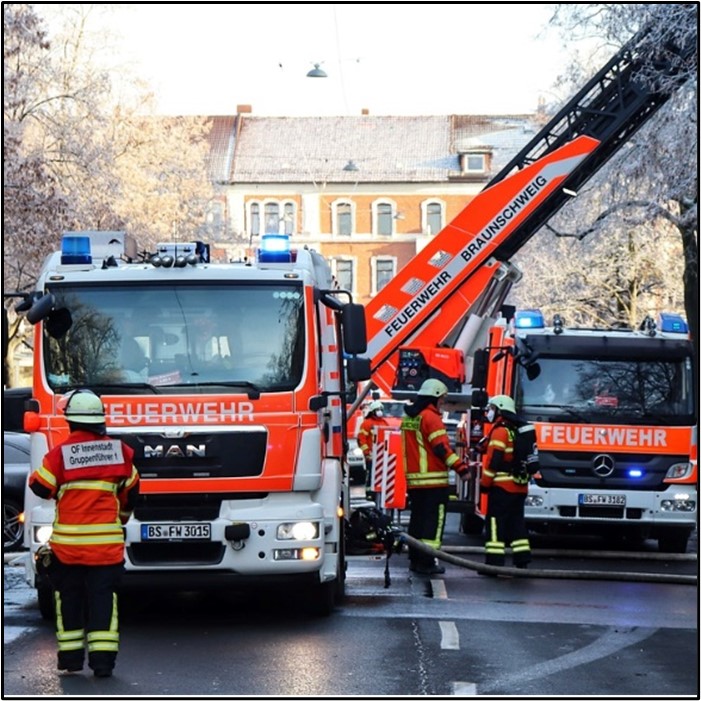
Sustainability
SmartLivingEPC meets in Dublin
During 9 & 10 October, ANEC met with its SmartLivingEPC project partners in Ireland. We discussed developments across the project work packages and discussed the way forward.
SmartLivingEPC is an EU-funded project that aims to revolutionise the way we assess and certify the energy performance of buildings. It works to deliver an energy performance certificate (EPC) that can help advance the implementation of the EPBD, promoting the energy efficiency of buildings and reducing carbon emissions in this sector. The project looks also at non-energy factors such as building smartness, indoor environmental quality and sustainability.
As a project partner, ANEC contributes to relevant standardisation processes for the EPBD implementation, particularly in delivering reliable and consumer-friendly EPCs.

Ecodesign
ANEC hosts expert workshop
On 9 September, ANEC hosted an online workshop to gather input from experts regarding best practices, key experiences, challenges and opportunities when influencing standards linked to the Ecodesign and Energy Labelling (ED/EL) framework.

Our Representatives working on ED/EL shared their experiences attending standardisation meetings in the field. A discussion ensued on means to strengthen the consumer voice with a focus on present and future Ecodesign & Energy labelling work.
The workshop fell under the EU-funded reaLIFEstandards project.
ANEC and BEUC support new rules for Printers and Cartridges
ANEC and BEUC have expressed strong support for the European Commission's decision to regulate printers and cartridges under the Ecodesign framework. The decision reflects our comments following the Ecodesign Consultation Forum on Imaging Equipment submitted in August.
The contribution followed the Forum's meeting on 3 July, where BEUC highlighted consumer frustrations with early printer failures and the high costs of OEM cartridges. BEUC and ANEC stress the need for durable and repairable printers, as well as access to third-party and refillable cartridges.

We also back the introduction of a repair score for printers which, if correctly designed and implemented, could help consumers compare repairability. However, both organisations oppose allowing software updates that degrade performance or cause incompatibility with cartridges, arguing that such harmful practices should be banned, not left to consumer consent.
Our joint effort is part of the Ecodesigned4Life project, a partnership between BEUC and ANEC, and our environmental colleagues, ECOS. Co-funded by the EU’s LIFE Programme, the project aims at reinforcing consumer and environmental perspectives in EU ecodesign and energy labelling legislation.
Digital Society
ETSI EN 303 645 V3.1.2 approved
ANEC is pleased ETSI EN 303 645 V3.1.2 ‘Cyber Security for Consumer Internet of Things: Baseline Requirements’ has now been approved and published.
The standard was first published by the ETSI Technical Committee on Cybersecurity (TC Cyber) in February 2019 as ETSI TS 103 645, establishing a security baseline for internet-connected consumer products and provide a basis for future IoT certification schemes. ANEC contributed to the development of ETSI TS 103 645 and supported it. Although the standard looks to define baseline security requirements, clear requirements are needed to set the bar higher for protecting consumers.

Towards secure AI for all
ANEC’s Chiara Giovannini was a panel speaker on 24 September at a webinar hosted by the AI Standards Hub. The webinar focused on AI security and how to make sure both civil society and other underrepresented groups are included in the discussion.
The panel explored recent research from the Centre for Emerging Technology and Security (CETaS) on the challenges associated with securing AI systems and the role international standards can play.

Chiara spoke about the work ANEC in CEN-CLC-JTC21 which is striving to close these security gaps. It is important to remember that for consumers, security risks very often lead to privacy risks as when data breaches happen, consumer personal data is at risk.
Despite the considerable time and resources needed to get involved in AI standardisation, we see a growing interest in civil society organisations as several of our experts are getting active in AI standardisation committees at national level. ANEC will continue to provide capacity building activities to aid societal stakeholder participation in AI standardisation.
Services
ERGP Stakeholder Forum
On 30 September, the European Regulators Group for Postal Services (ERGP) hosted its 5th Stakeholders Forum, gathering regulators, postal operators, and stakeholders to discuss the future of the postal sector over the next two decades. ANEC participated.
Key issues included maintaining the Universal Service Obligation (USO), sustainability, and potential EU-level regulatory reform. The soon-to-be-published RPA prospective study, expected in November 2024, will further inform this reform process.
Chair Dan Sjöblom emphasised evolving consumer need and the political significance of postal services. Merete Clausen from DG GROW updated attendees on an upcoming study, due also in November, that will address workforce reskilling and environmental challenges. Dr Herbert Weißensteiner, Austrian member of the ANEC General Assembly, and Michela Vuerich, ANEC Lead Programme Manager for Sustainability & Services, attended the meeting and welcomed the ERGP's 2025 Work Programme, particularly its focus on quality of service and consumer protection.
DG GROW stressed the essential role postal services play in keeping societies connected and resilient. As the postal sector continues to evolve, these discussions will be crucial in shaping a regulatory framework that meets the challenge of the future while ensuring postal services remain accessible and sustainable for all.
News from ANEC member countries
Czechia - The importance of standards in the digital society!
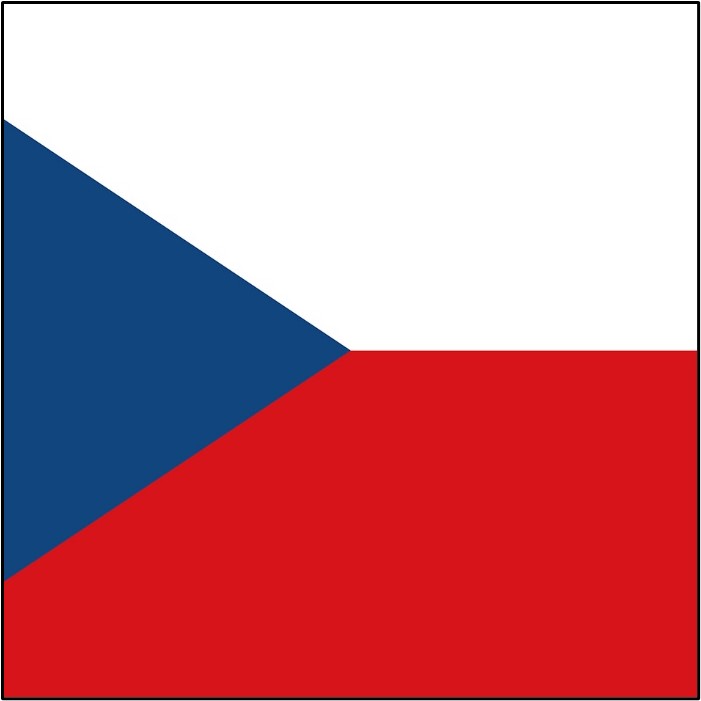
The importance of the standards for the proper functioning of the market is usually not self-evident to the market participants and operators – manufacturers, service providers, businesses, or consumers. They all often underestimate the impact of standards.
Libor Dupal, the Czech member of the ANEC General Assembly, reports that the Cabinet for Standardization, in close co-operation with the Czech Consumer Association, and with the support of various institutions – in particular the Czech Agency for Standardization (ČAS) and the Quality Council of the Czech Republic - has been working systematically for a long time to increase the visibility of standards in the everyday life of consumers.
In 2024, ČAS approved to fund the preparation of a web-based information campaign, including a study entitled "Digital Society Services, including Artificial Intelligence: With standards for the benefit of consumers and the market".
The project deliverables emphasise the consumer perspective. The study itself first provides an overview of the current developments of the EU legislation on information and digital society services. It also comprehensively documents consumer participation in EU standardisation, in particular those carried out by ANEC. It also outlines a wide range of ICT priorities for the current and future years.
Based on the study, the Cabinet for Standardization has produced the informative publication "Consumer and Standardization at the Service of the Digital Society" (available in hard copy and e-format). The project was supported by the Quality Council of the Czech Republic. With the intention of offering a more "user-friendly" presentation to consumers, SMEs and other market participants, the publication provides summarised information on these complex issues which are becoming more and more important for everyone, now and in the not-too-distant future.
Read the projects outputs: thematic brief, the full study and the publication.
Denmark - Unwanted chemicals in bubble solutions and more

Results from the Danish Consumer Council THINK Chemicals’ test of 31 bubble solutions for children found that half contained perfume or allergenic preservatives, with some including suspected endocrine disruptors. Only two products were free from these unwanted chemicals, earning an A-rating. Most lacked a full ingredient list, while 14 products did not disclose their content when asked. It is advised to choose products with transparent labelling and avoid allergenic substances. For more details and tips, view the full article.
A further study found that 22 out of 39 plastic drinking bottles for children released the endocrine-disrupting chemical DiBP after multiple dishwasher cycles. Though none exceeded legal limits, the presence of such chemicals is of concern due to potential health risks, particularly for children. To minimize exposure, it is recommended to use stainless steel or glass bottles, follow care instructions, and avoid using plastic bottles for anything other than water. For full details, read the article.
A test by the Danish Consumer Council found that most disposable tableware from the online retailer Temu contains excessive levels of PFAS, "forever chemicals" that are harmful to health and prohibited in Denmark when in direct contact with food. Nine out of ten paper and cardboard items tested had problematic fluorine substances, with some containing levels 10 to 50 times higher than permitted. Consumers are advised to be cautious when buying such products, especially from non-EU web shops. Read “PFAS found in disposable tableware from Temu”.

John Wood, an ANEC Representative from the United Kingdom, has been appointed a BSI consumer representative to BCT/1 ‘Brain Computer Interfaces’ which is the UK mirror committee to ISO/IEC JTC1/SC4. This exciting new area examines the possibility of controlling computers and other items - such as wheelchairs - by direct engagement with brain waves. Work has started on a suite of new standards covering the hardware design, ethics, privacy and safety aspects of Brain Computer Interfaces (BCI).
BCI involves tapping into the electrical activity taking place in the brain. The tiny electrical signals are amplified and analysed to extract patterns that can be correlated with a subject’s intention to extend a limb or move a cursor. Without moving a muscle, a toy drone can be controlled by thought alone.
The electrical activity can be recorded via sensors applied to the surface of the head or by the insertion of tiny sensors into the brain itself. The applications being examined do not involve the application of invasive sensors
Use cases have been prepared for the use of BCI for detecting advance warning of epileptic fits, control of exoskeletons - enabling totally paralysed individuals to walk - and robotic arms to be controlled by thought processes alone.
The domain of BCI raises consumer issues such as autonomy, potential harm through conditioning, equality of access, privacy and data handling, side effects, usability and potential for misuse.
Information on ISO/IEC JTC 1/SC 43 – the target for the work of BCT/1
| List of meetings 2024 |
For comments or if you wish to write an article for the ANEC Newsletter, please contact: Cezara Popovici (cpo(at)anec.eu).


